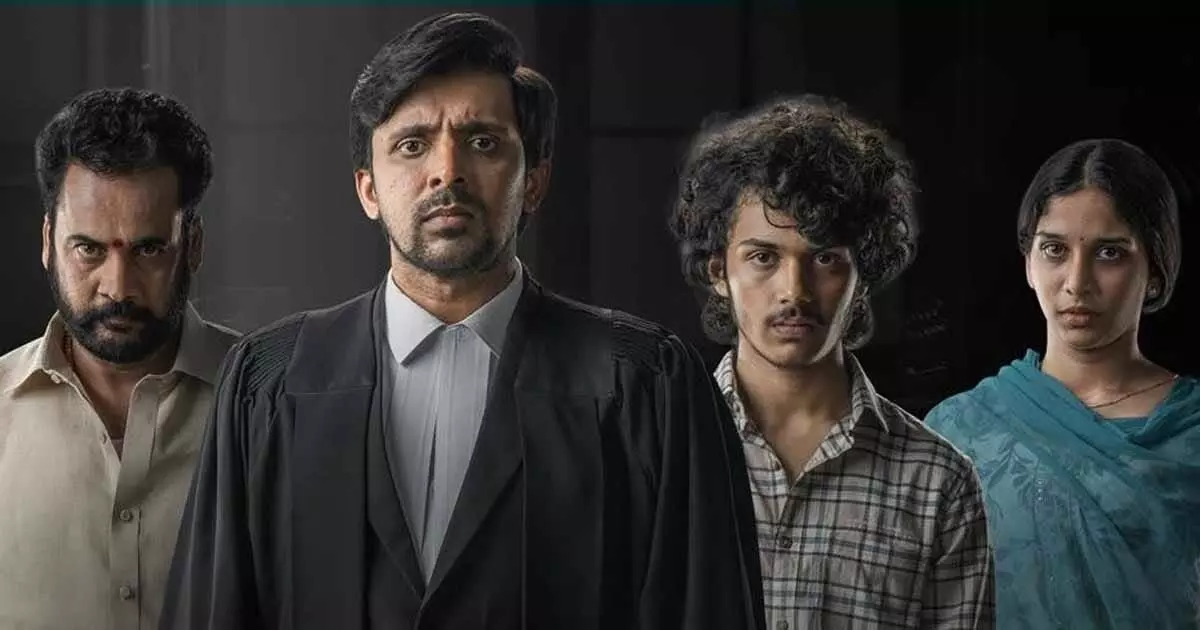Court - State Vs A Nobody : A Review from the child rights lens
I watched it solely to see how POCSO was presented and packaged for the masses - and it was a disappointment
By Newsmeter Network
Court - State Vs A Nobody : A Review from the child rights lens
Hyderabad: As an individual, I’ve always enjoyed courtroom dramas, and as a child rights worker, I was initially excited to learn that this film revolves around POCSO - a 12-year-old act designed to protect children from sexually motivated crimes. However, my enthusiasm went down when I realized the film’s premise hinges on the "misuse" of the law. I watched it solely to see how POCSO was presented and packaged for the masses - and it was a disappointment.
The notion of "misuse" often surfaces as a counterargument to laws born from years of struggle to address systemic issues. This narrative is typically wielded by oppressors - the very people these acts aim to hold accountable - to safeguard their hegemony and escape legal scrutiny. Before delving into why the film’s content falls short, I must stress a critical point: systemic violence against a defined socio-cultural minority and isolated cases of abuse or "misuse" affecting the privileged majority are never the same! It’s disheartening that the film chooses to spotlight only the misuse of the act, sidelining the systemic abuse against children it was created to combat. By focusing solely on misuse, it steadily undermines the spirit and purpose behind the law’s existence.
The film boasts a talented cast, delivering captivating, excellent edge-of-the-seat performances. Yet this is precisely how it misleads. Audiences might leave the theatre spellbound, oblivious to the child rights perspectives buried beneath the spectacle.
Studies reveal that about 95% of child abuse cases - especially sexual abuse - involve perpetrators known to the child. Abusers deliberately build familiarity, which often complicates reporting. Most often, these crimes remain hidden within the same four walls that silently witness a child’s desperate cry for help.
That said, one of the film’s arguments compares a 40-year-old man abusing a 6-year-old child to a 19-year-old boy in a consensual relationship with a girl aged 17+. Instead of criminalizing naturally occurring teenage romantic relationships, the solution lies in promoting legal and sexual awareness for children and communities to prevent the misuse of laws that traumatize children through criminal systems, alongside ensuring access to safe abortion policies to decriminalize and destigmatize teen sex - issues the film could have explored but fails to address.
Additionally, the 19-year-old male protagonist declares that men out there are dangerous and terrible, a statement he voices out aloud as a young man himself. This perspective, delivered by a scripted character, feels unnatural, as real men - especially young ones - rarely exhibit such self-awareness.
'Court' centers on a case where mutual love, between a poor watchman’s son and a girl from an upper-caste, feudal household, is accused of being rape and abuse of the minor girl. But what about cases where abuse is disguised as love? Shouldn’t that be the real issue we must collectively address? Not everything is black and white, yet the film takes this binary approach in unpacking POCSO. While it highlights alleged misuse, it fails to raise awareness about what the act entails or represents. I wish the narration had imparted some of this knowledge to the masses applauding the film’s missed and misleading logic.
Beyond the courtroom scenes feeling unreal, the complete absence of child safeguarding institutions - such as the Child Welfare Committees (CWC), the District Child Protection Units (DCPU), or even procedural mentions of POCSO’s intervention protocol - was stark, without even a token mention. At least, this would have made the audience aware that these designated systems exist for safeguarding the rights of children, beyond regular courts and police stations.
Towards the end, the defence raises a bizarre argument: how will a girl, currently aged 17 years, 11 months, and 10 days, attain mental maturity just 20 days later when she turns 18 - and how this is not a case at all at that time! It’s as absurd as suggesting we raise the legal marriage age from 18 to 21 to prevent child marriage. Do you see the ridiculous pattern in these arguments? That’s what the film stakes itself on.
Ignoring the dreamy cinematic liberties the film takes, the true premise should have been how POCSO - despite its robust framework on paper - succumbs to socio-economic, cultural, and political structures, rendering it a toothless law that fails to deliver justice to the most vulnerable population: children! Instead, the film’s final shot - where Jabili hugs Chandu, saying it’s finally her 18th birthday - conveys a troubling message, especially to younger audiences: just wait until the girl turns 18! Once that happens, boys are free to do as they please, and it’s merely a "case of love" - nothing more. The fact that arguments of "misuse" persist even with laws like Section 498A, Nirbhaya, and others related to women aged 18 and above - this, in turn, creates scope for yet another absurd sequel to weaken the spirit of existing legal systems!
Author: Hima Bindu holds a postgraduate degree in Communication & Journalism from Osmania University, Hyderabad. With a focus on education, child rights, and gender, she brings a rights-based perspective to her work. She has been actively engaged with migrant children in the Jawaharnagar slums of Medchal, emphasizing the thematic areas of Education, Protection, and Participation. Hima is committed to strengthening government institutions to ensure the effective implementation of child rights. Her core values - empathy, inclusion, and rationalism - guide her efforts.
Disclaimer: This review is written solely from a child rights perspective, and therefore does not comment on the film’s production or technical aspects.
The views and opinions do not reflect the official policy or position of NewsMeter.